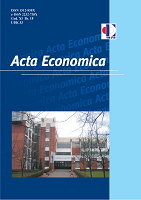Негативна селекција и морални хазард као узрочници неефикасне транзиције и склоности ка кризи у Босни и Херцеговини
Negative selection and moral hazard as causes to inefficient transition and tendency towards crisis in Bosnia and Herzegovina
Author(s): Rajko TomašSubject(s): National Economy, Business Economy / Management, Political economy, Financial Markets, Human Resources in Economy, Socio-Economic Research
Published by: Економски факултет Универзитета у Бањој Луци
Keywords: Transition; negative selection; moral hazard; asymmetric information; economic reforms;
Summary/Abstract: Bosnia and Herzegovina (BiH) is facing the consequences of inefficient transition (1), strategic concentration of economic development in large countries to detriment of the small ones (2), and economic crisis (3). This paper analyses the causes and the consequences of inefficient transition in BiH, and the opportunities for implementing reforms to eliminate the afore said, as well as for reinforcing the preconditions for getting out of the economic crisis. Elementary reasons to inefficient transition include negative selection of investors throughout privatisation process, and the moral hazard in the operations of privatised companies. Public capital became the property of those who have the money, and not those who would most efficiently use it. Instead of a privatisation, which provides for unity of private entrepreneurship and risk, we have witnessed the tycoons taking over significant part of the economy, accumulating private wealth with the help of the state and to its detriment, leaving aside the market competitiveness. The burden of crisis in BiH has targeted the two most delicate tiers: uncompetitive economy and poor population. The strategy for getting out of the crisis seems paradoxical: it is expected that the economy, burdened by negative selection and moral hazard, would become more competitive, and the employees more productive with, realistically speaking, lower wages. To mitigate the consequences of the economic crisis, BiH must, fi rstly, face the inefficient transition and implement reforms to eliminate irregularities of the transition process. Economic and legal systems should enable for the non-profi table forms of keeping and use of resources to go to ruin and be replaced by more efficient ones. Efficient use of resources is the best tool to protect the very resources; it increases the price thereof as well as the total public wealth. The same applies to labour. High labour productivity best protects the workers’ rights. The state should not be protecting the proprietors of resources against the market forces, but rather the resources against nonmarket use.
Journal: Acta Economica
- Issue Year: 11/2013
- Issue No: 18
- Page Range: 9-30
- Page Count: 22
- Language: Serbian

